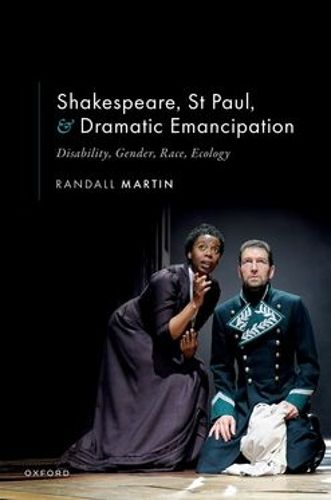Readings Newsletter
Become a Readings Member to make your shopping experience even easier.
Sign in or sign up for free!
You’re not far away from qualifying for FREE standard shipping within Australia
You’ve qualified for FREE standard shipping within Australia
The cart is loading…






Shakespeare, St Paul, and Dramatic Emancipation: Disability, Gender, Race, Ecology breaks new ground by revealing the playwright's dramatic reinvention of early modern Pauline texts and paratexts in a wide range of plays. Their common thread is Pauline-allusive characters who resist political, social, and/or physical subjection and aspire -- with mixed degrees of failure and success -- to emancipated lives of fulfilled being and belonging. Historically contextualized case-studies of Henry VI Part Three and Richard III, Twelfth Night, The Comedy of Errors, Pericles, The Winter's Tale, The Tempest, and King John explore desires for freedom on authorial and theatrical as well as thematic levels. They seek out new critical directions by bringing post-typological and postsecular 'Pauline Shakespeare' into conversation with contemporary theories of disability, gender, race, and ecocriticism. A further original feature of the book is intertextual attention to parallel critical approaches to St Paul by several early modern women writers. Shakespeare, St Paul, and Dramatic Emancipation rediscovers a polyvocal, complex, and emancipatory Paul as a significant career-long resource for the playwright's innovative characterization and dramaturgy.
$9.00 standard shipping within Australia
FREE standard shipping within Australia for orders over $100.00
Express & International shipping calculated at checkout
Shakespeare, St Paul, and Dramatic Emancipation: Disability, Gender, Race, Ecology breaks new ground by revealing the playwright's dramatic reinvention of early modern Pauline texts and paratexts in a wide range of plays. Their common thread is Pauline-allusive characters who resist political, social, and/or physical subjection and aspire -- with mixed degrees of failure and success -- to emancipated lives of fulfilled being and belonging. Historically contextualized case-studies of Henry VI Part Three and Richard III, Twelfth Night, The Comedy of Errors, Pericles, The Winter's Tale, The Tempest, and King John explore desires for freedom on authorial and theatrical as well as thematic levels. They seek out new critical directions by bringing post-typological and postsecular 'Pauline Shakespeare' into conversation with contemporary theories of disability, gender, race, and ecocriticism. A further original feature of the book is intertextual attention to parallel critical approaches to St Paul by several early modern women writers. Shakespeare, St Paul, and Dramatic Emancipation rediscovers a polyvocal, complex, and emancipatory Paul as a significant career-long resource for the playwright's innovative characterization and dramaturgy.